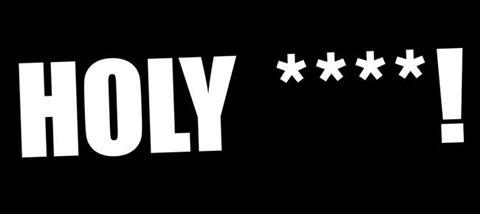
What follows are 2,000 words about other words that we can’t print in a Christian magazine. Swear words like ****, ******** and ****. Some people would include **** (but a lot of people are becoming more relaxed about that one). Of course, everyone realises that **** is a swear word, but there are definite shades of grey when it comes to ****.
You see? This is going to be tricky.
The usual idea of a culture column is to talk about something happening in the wider world and then explain how God redeems it, and what we can learn from it, and so on. Then they asked me to write about swearing. Oh, ****.
So here’s a disclaimer. If you don’t like hearing or reading swear words, skip this article. Equally, if you are a parent of a precocious and brilliant young child who likes nothing better than to sit down each month and read Premier Christianity from cover to cover, this may be the edition to keep off the coffee table until after the watershed. For in this article, I am going to use some swear words.
So, if that’s ok with you...read on.
I guess I should get this out of the way early on: there’s nothing ‘good’ about swearing. It’s not holy, it doesn’t somehow reflect part of God’s character and it doesn’t bring us closer to him. But then nor does the word ‘tomorrow’, or trainers, or parsnips. Actually, parsnips do reflect part of God’s character. They’re brilliant. Next month’s culture column: parsnips, but for now, swearing.
BLASPHEMY ISN’T COOL
Let’s begin by clarifying what I’m not talking about. I’m not going to defend blasphemy – taking the Lord’s name in vain. We can all agree that this isn’t ideal. My life revolves around the life Jesus led and the God who created the universe; if I’m going to invoke their names, it shouldn’t be because I’ve stubbed my toe.
But the flip side of this is that a lot of the so-called blasphemy we might hear on a daily basis isn’t, really, blasphemy. Sure, the name Jesus is used, but when most people exclaim ‘Jesus!’ or ‘Christ!’ they aren’t referring to our saviour. They are simply grasping for a word that they have learned to use to exclaim surprise or shock. In the same way, when people comment ‘OMG’ on someone’s Instagram selfie, they’re not calling on the creator of the universe, nor demeaning humanity’s need for one...they just can’t believe how perfect their friend’s hair looks.
Perhaps there’s a guiding principle here. As Christians we hold ourselves to different standards than the world. Therefore, it isn’t necessarily our job to regulate the language of those around us. Instead, our job is to glorify Jesus in all we do, and since I’ve aligned my life around Jesus, his name isn’t something that I take lightly.
WHEN SWEARING GOES BAD
Let’s also clear up another kind of swearing that I don’t want to defend: swearing at someone. Many of these phrases end with ‘off’ or ‘yourself’. The problem with this kind of swearing is less about the words used, but the heart behind them – anger and offence directed at someone else. If you’re channelling your anger at someone in that way, there’s no way that can be coming from a good place.
There are also poor reasons that have been put forward by some Christians to justify swearing. For example, that somehow by doing it we are becoming culturally relevant – almost missional – in our dealings with the outside world. Let’s not kid ourselves; no one is going to get converted because you swear. Thankfully, we live in a Christian world that has largely abandoned the ill-advised ‘flirt-to-convert’ strategy, so let’s not attempt to strike up a ‘swear-to-care’ or ‘blaspheme-to-redeem’ approach either.
However, it’s also worth remembering that many people who wouldn’t call themselves Christian don’t even think of swearing as rude or offensive – it’s merely part of their language. If we demand that anyone who enters our church cleans up their language to commonly accepted Christian standards even before they step into the building, we create another barrier for ‘unchurched’ people. If we want church to be a place where people can come in and be ‘real’, we may need to embrace their language rather than spend our time being offended by it and correcting them.
CONTEXTUAL CUSSING
I confess now: I swear. I’m not proud of it, but I’m occasionally profane with my language. My expletive count varies from place to place: my girlfriend doesn’t like swearing, so I try not to swear around her, nor around my parents, church friends, or in the office. But the guys I go to football with are less fussed, and so when I’m with them, my language creeps in that direction in the same way that I develop a slight Brummie twang when I spend time with my pals from Birmingham.
Why do I moderate my language in certain company? Our call is to love others – and though I don’t always understand it, many people are deeply offended by swearing, and so it’s worth respecting that by not saying things that will upset people. In Romans 14, Paul talks about refraining from actions which, although we may be comfortable with them ourselves, may cause a fellow Christian to ‘stumble’ (verse 20). In his case the offence was eating meat offered to idols, but in the same way we’d be wise to tailor the kind of things we talk about if those in our company might be hurt, or it’s simply inappropriate.
PAUL’S UNWHOLESOME TALK
In Ephesians, Paul writes: ‘Do not let any unwholesome talk come out of your mouths, but only what is helpful for building others up according to their needs, that it may benefit those who listen’ (Ephesians 4:29) and ‘Nor should there be obscenity, foolish talk or coarse joking, which are out of place, but rather thanksgiving’ (Ephesians 5:4). These verses alone might give the impression that the answer to the issue of swearing is clear and simple.
But there are a couple of problems with using these verses as a blanket ban on bad language. Firstly, Paul could have gossip and slander in mind by ‘unwholesome talk’, just as much as swear words. Secondly, it seems to allow for an incredible amount of contextualisation: what one person might call ‘obscenity’ might be fine for others. Many Christians would be fine with calling something ‘crap’, others would hate it. Who decides what is in and what is out? Some people might be fine with ‘crap’ but struggle with ‘bollocks’. It seems a bit arbitrary for any one person to be in charge of which words we’re comfortable with. For Christians for whom swearing is not such a big deal there may be a case for allowing (in the spirit of Romans 14) a certain amount of latitude. For instance, in the USA the ‘Bad Christian’ podcast has become one of iTunes’ most popular Religion & Spirituality downloads. The format consist of three members of the Christian rock band Emery joking about life, music and faith. It can get a bit crude at times, and they sometimes swear too.
In response to criticism, show host Matt Carter admits that their show won’t appeal to everyone: ‘Everyone has a different line of what they think is immoral and coarse. I don’t know how to define what is coarse, but I’m not saying I get it right either.’
However, the presenters are unashamed about their Christian faith, and say that part of the podcast’s appeal to young people and non-Christians is because they don’t pretend to be anything they are not, as they avoid the trap of speaking a ‘weird Christian-ese language’. Let’s not forget that Paul wasn’t afraid to use some pretty harsh language himself. In Philippians he says that he considers all things (depending on your translation) ‘rubbish’, ‘garbage’, or ‘loss’ (3:8), compared to the joy of knowing Jesus. The word in Greek is skubalon. It’s used only once in the New Testament and, from what we can figure out, appears to be a first-century swear word meaning something between rubbish and excrement. It implies nastiness, worthlessness and repulsiveness. In other words, compared to the joy of knowing Jesus, everything else is a bit...shit.
TONY FLIPPING CAMPOLO
In a piece of rhetorical brilliance forever enshrined in evangelical folklore, Christian leader Tony Campolo once swore on the main stage of a large Christian event. His words were: ‘I have three things I’d like to say today. First, while you were sleeping last night, 30,000 kids died of starvation or diseases related to malnutrition. Second, most of you don’t give a shit. What’s worse is that you’re more upset with the fact that I said “shit” than the fact that 30,000 kids died last night.’
It was a brilliant, arresting reminder that we can get our priorities topsy-turvy. But there’s another reason Tony Campolo invoked the s-word here – what other words come close to summing up the horror of that situation? There are some things worth getting genuinely, righteously angry and expressive about – and that’s where swearing, used judiciously, can be most powerful.
Paul wasn't afraid to use some pretty harsh language himself
Sometimes, ‘Oh heck’ just doesn’t come close to scratching the surface. There are problems in this world that are so disgusting, so ungodly, that the only way to describe them is by using a shocking word. Equally, there are some feelings so visceral, moments so sublime, that the only way I can get close to describing them is by invoking the f-word. That will be offensive to some people but, when I use it, the ‘effing’ has very little to do with the act of intercourse, it’s about emphasis, and (for me at least) there’s no word in our limited lexicon that allows for the raw, heart-thumping emotion it conveys.
Of course we would run the risk of emptying our vocabulary of any actual creativity if we were to reach for a swear word every time we need to emphasise a point or express depth of emotion. And I’m certainly not advocating for anyone to take up swearing if they don’t already. But sometimes, in my personal experience, it’s a very effective way to get the point across. So let’s not invest swearing with an out-and-out scandalous status that it doesn’t necessarily deserve.
As Christians we are called to be distinct from the rest of the world, to model something to the rest of creation. I want my language be an outward showing of my inward humanity – that’s basically what the Psalms do. But the fallen, prosaic nature of my vocabulary means I sometimes resort to words my nan wouldn’t ‘flipping’ enjoy. We can do better than swearing, but we can do a heck of a lot worse.




























